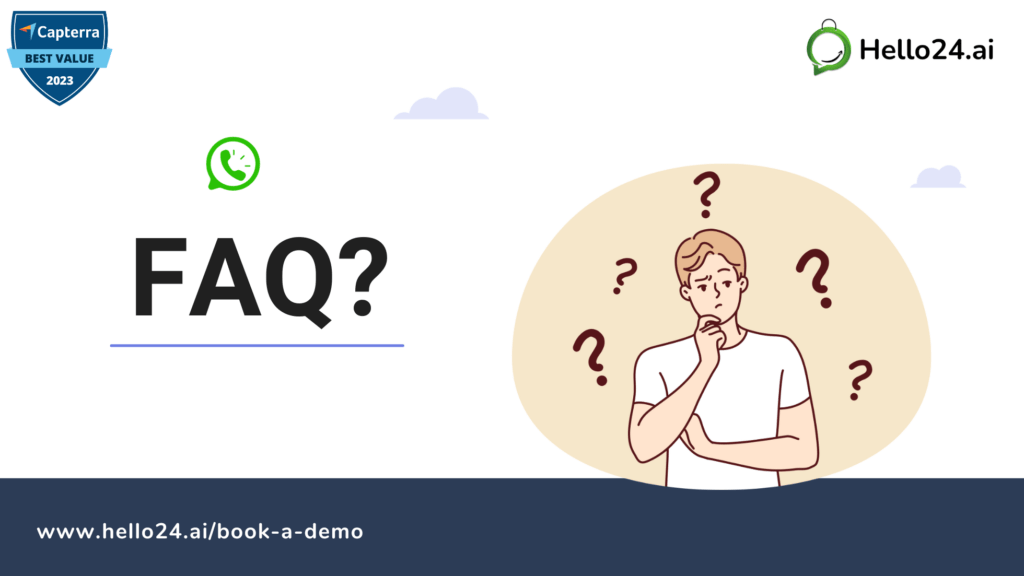From the WhatsApp API point of view – conversations (messages) are categorised based on their type which is Marketing, Utility, Authentication, and Service. The name itself speaks about its purpose as well and hence it is priced accordingly per conversation.
Now the frequently asked questions are around two main types: utility messages and marketing messages. While both serve distinct purposes, understanding the difference between them is crucial for effective communication.
📢What are Utility Messages Temaplates on WhatsApp API
Utility messages are characterized by their practicality and relevance to the recipient’s immediate needs. They are typically designed to provide information, assistance, or facilitate a specific action.
On the WhatsApp Business API, Utility Messages are a specific category of pre-approved message templates designed for businesses to send important, non-promotional information related to a customer’s existing account, transaction, service, or interaction.
Think of them as essential updates that keep customers informed and enhance their experience. They are distinct from marketing messages, which are promotional in nature, and service messages, which are free-form replies within a 24-hour customer service window.
Examples of utility messages include:
- Transactional updates: Notifications related to purchases, deliveries, or other transactional activities.
- Service alerts: Messages that inform users about service updates, account activities, or security notifications.
- Event reminders: Notifications about upcoming events, appointments, or important dates.
✅FYI: Want to know how to send whatsapp broadcast messages without saving numbers (watch video here)
💡Common Use Cases for Utility Messages:

- Order Management:
- Order confirmations
- Shipping updates (e.g., “Your order has shipped,” “Your delivery is out for delivery”)
- Delivery notifications
- Order cancellations or changes
- Account Updates and Alerts:
- Account registration confirmations
- Payment reminders or confirmations
- Billing statements or invoices
- Security alerts (e.g., “New login detected on your account”)
- Subscription renewals or expirations
- Appointment Reminders:
- Confirming appointments
- Sending reminders before an appointment
- Notifying of appointment changes or cancellations
- Customer Feedback:
- Requesting feedback on a recent order or service
- Customer satisfaction surveys
- Service-Related Information:
- Updates on service outages or maintenance
- Resolving customer queries outside the 24-hour service window (by prompting the user to reply to re-open a service conversation, or by delivering the resolution itself).
📌Sample WhatsApp Utility Messages Template
Here are some examples of utility messages, designed to be informative and enhance the customer experience on WhatsApp:
📦 Order Confirmation
This message confirms a customer’s recent purchase, providing essential details and a clear next step.
- Sample Message:
🎉 Hi {{customer_name}}! Your order #{{order_number}} from {{business_name}} has been successfully placed! We're excited for you to receive your items. ✨ You ordered: - {{item_1}} - {{item_2}} - (and more!) Your estimated delivery date is {{delivery_date}}. You can track your order here: {{tracking_link}} Thank you for shopping with us! 😊
🚚 Shipping Update
Keep your customers in the loop as their package makes its way to them.
- Sample Message:
Great news, {{customer_name}}! Your order #{{order_number}} is now on its way to you! 🚀 It was shipped from {{business_name}} on {{ship_date}} and is expected to arrive by {{estimated_delivery_date}}. Track your delivery status here: {{tracking_link}} We hope you love your new items! ✨
🗓️ Appointment Reminder
Help your clients remember their upcoming appointments and reduce no-shows.
- Sample Message:
Hello {{client_name}}! Just a friendly reminder that you have an appointment with {{service_provider}} at {{business_name}} on {{appointment_date}} at {{appointment_time}}. ⏰ Service: {{service_type}} Location: {{business_address}} If you need to reschedule or cancel, please reply to this message or call us at {{phone_number}}. See you soon! 👋
💸 Payment Reminder
Gently remind customers about upcoming payments or overdue balances.
- Sample Message:
Hi {{customer_name}}, this is a reminder from {{business_name}} regarding your upcoming payment. 💰 Your invoice #{{invoice_number}} for {{amount_due}} is due on {{due_date}}. You can view your invoice and make a secure payment here: {{payment_link}} Thank you for your prompt attention! 🙏
🔒 Account Security Alert (e.g., Password Change)
Inform users of important account activities for security and transparency.
- Sample Message:
🚨 Alert for {{user_name}}! Your password for your {{app_name}} account was recently changed on {{date}} at {{time}}. If you did not make this change, please contact our support team immediately at {{support_phone_number}} or visit {{support_link}}. Your account security is important to us! ✅
📢What are Marketing Messages Templates on WhatsApp API?
Marketing messages, on the other hand, are specifically crafted to promote products, services, or brands. They aim to capture the recipient’s attention and encourage them to take a particular action, such as making a purchase, subscribing, or engaging with the content. Key features of marketing messages include:
- Promotional content: Messages focused on promoting products, services, or special offers.
- Brand announcements: Updates about brand initiatives, new launches, or important brand-related information.
- Call-to-action focused: Encouraging users to click on links, make a purchase, or participate in a promotional activity.
📌Sample WhatsApp Marketing Messages
These examples showcase how businesses can use WhatsApp for promotional purposes, keeping the messages engaging and personalized.

🛍️ New Product Launch Announcement
Generate excitement and drive traffic for a new offering.
- Sample Message:
🌟 Exciting News, {{customer_name}}! 🌟 Be among the first to discover our brand new collection: *{{product_collection_name}}*! ✨ We've poured our hearts into these unique pieces, just for you. Tap here to explore the magic: {{product_link}} Don't miss out on these must-haves! 👇
🏷️ Special Discount / Offer
Entice customers with a limited-time offer or discount.
- Sample Message:
Hey {{customer_name}}! 👋 Looking for a sweet deal? Enjoy **{{discount_percentage}}% OFF** on *all {{product_category}}* for a limited time! 🎉 Use code: `{{promo_code}}` at checkout. This offer expires on {{expiry_date}}, so grab your favorites now! Shop here: {{shop_link}} Happy shopping! 🛍️
🛒 Abandoned Cart Reminder
Gently nudge customers to complete their purchase, possibly with an incentive.
- Sample Message:
Psst... {{customer_name}}! 😉 Looks like you left some goodies in your cart at {{business_name}}. 🛒 We noticed you were interested in: - {{item_1}} - {{item_2}} (and more!) Complete your order now and don't miss out! We've even added an extra **{{cart_discount_percentage}}% OFF** for you! 👇 {{cart_link}} We're holding them for you! Hurry, offer valid for 24 hours. ✨
🌟 Exclusive Loyalty Offer
Reward loyal customers with a special, personalized deal.
- Sample Message:
Hello {{customer_name}}! As a valued {{loyalty_program_tier}} member, we have a special treat just for you! 💖 Enjoy **{{exclusive_discount}}% OFF** your next purchase at {{business_name}}! It's our way of saying thank you for being awesome. 🎉 Claim your offer here: {{exclusive_offer_link}} Offer valid until {{expiry_date}}. Happy shopping! 🎁
📧 Newsletter / Content Update
Share engaging content, blog posts, or company news.
- Sample Message:
Hi {{customer_name}}! 👋 We've just published our latest blog post on *{{topic}}*! 📖 Discover new insights and tips from the {{business_name}} team. Read it now: {{blog_post_link}} Let us know what you think! 👇
📢Key Differences of Utility and Marketing Messages:
- Intent and Purpose: The primary distinction lies in the intent and purpose of the message. Utility messages are designed to provide practical value or information while marketing messages aim to promote and sell.
- Recipient Focus: Utility messages are centered around the recipient’s needs or actions, ensuring relevance and usefulness. Marketing messages, however, are more focused on the sender’s objectives, often seeking to influence the recipient’s behavior.
- Content Tone: Utility messages tend to be more straightforward and informative, while marketing messages may employ persuasive language, branding elements, and promotional content.
- User Consent: Users generally expect utility messages to be directly related to their interactions or transactions, while marketing messages may require explicit consent or opt-in from the user.
In conclusion, recognizing the difference between utility and marketing messages templates in WhatsApp is vital also from a pricing point of view.
Striking the right balance between these message types can enhance user experience and contribute to a more positive and engaging interaction on the platform.
Want to see messaging campaigns with WhatsApp API live?


